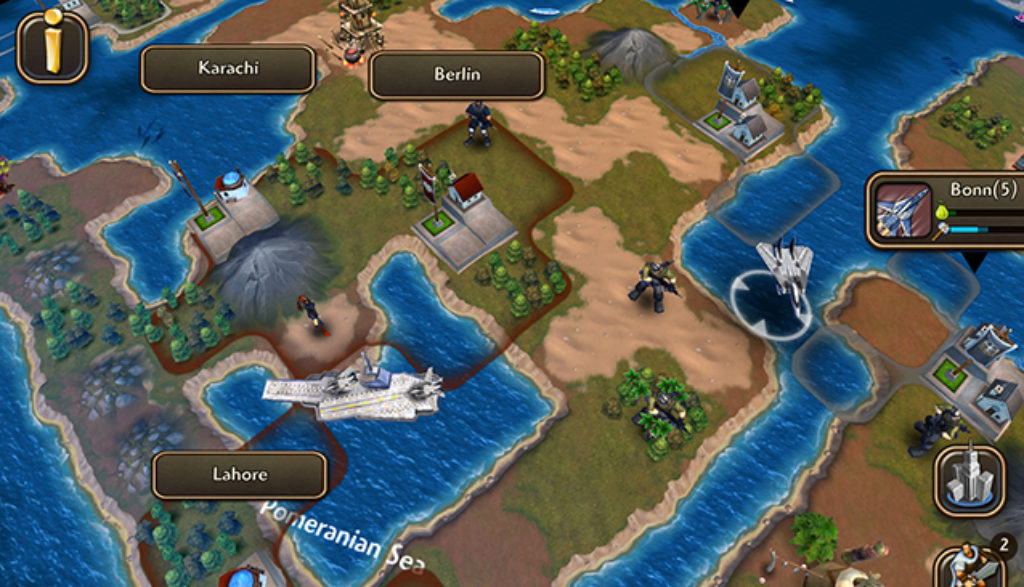
If you’re one of those people who always wants to pull out the Risk game whenever friends or family are looking for something fun to do—or you just look forward to dressy occasions because your Napoleon hat makes you look so tall and commanding—then I have some good news for you. Sid Meier, who’s created a series of extremely popular strategy games for the PC, has finally sailed a title into port on the PlayStation 3 and Xbox 360.
In Sid Meier’s Civilization Revolution players take the reins of one of 16 different civilizations that they can found and try to build into a world-dominating powerhouse. Each of these great societies—including the Greeks, the Aztecs, the Spanish and the Americans—start with its own specialized cultural benefits that will help you out as you progress through the ancient, medieval, industrial and modern ages. For instance, if you play as Otto von Bismarck, commander of the German homeland, you initially gain an automatic upgrade to veteran troops with which you can dominate lesser-skilled opponents, whereas donning the toga of the Roman Julius Caesar offers you a cultural jumpstart with an established republic and a code of laws.
Why is that important? Because the ultimate goal of becoming grand pooh-bah of the globe can be achieved in any of four ways: militarily, culturally, financially or technologically. And I didn’t list the military first because it’s easiest. You certainly can try to rule the world by building bigger, badder guns and missiles—weapons development can advance all the way to the atomic bomb. But there are penalties for tying all your resources up in war, so it’s not always the best choice.
Building schools or places of worship and cultivating great inventors and thinkers, for instance, can draw neighboring nations to your culture without firing a single shot. On the other hand, choosing to acquire great wealth and a worldwide bank or developing the technology to rocket your nation into space can win the game just as handily.
Plant Your Flag
Before you attain that vaunted world-ruling glory, however, you’ll have to master the humble basics of building a society. Each game focuses on a random collection of five competing cultures that start with a group of settlers planting a flag. The terrain surrounding your initial hamlet is divided up into squares that indicate how much food, material or trade each can sustain.
Communities with lots of food resources will support quick growth in the population. Production squares full of wood and ore can help the country build necessities. Trade-heavy squares offer up scientific research that helps players discover everything from the alphabet to atomic theory. Or gamers may simply want to apply those resources to gold production and buy the stuff they need after other civilizations do all the grunt work. It all comes down to your strategic choices and how they develop your domain. And therein lies the fun.
Getting Sid’s Help
Now, if you’re worried that keeping track of all these details will leave you bleary-eyed, you can relax. This is ol’ Sid Meier’s area of expertise. Gameplay is designed to be a fast-paced experience (with a full game running in the area of a Risk-like four to five hours). He’s added in little governmental and cultural advisers who pop up from time to time to offer humble suggestions to your kingship. And in no time at all you’ll be balancing the wisdom of developing mass transportation against sailing out to try to discover the Ark of the Covenant.
Of course, as you obtain great things of value there are inevitably going to be finger-wagging tyrants from other nations who will want to shove their military might in your face and try to bully you out of lock-stock-and-barrel. You either sit down at the diplomacy table and eventually give up some of your gain—assuring your opponents a tech or knowledge boost—or gather the troops and go to war.
Thankfully, no blood or guts are spilled in these hostilities. Battle wages between little groups of figures or vehicles—like tanks and fighter planes—that fight it out until one side or the other blips out of sight. In fact, the only content issues in the game are minor and show up in the form of animated leaders (Princess Cleopatra from Egypt and Queen Catherine of Russia) who both wear cleavage- and belly-baring dresses.
Real-World Extra Credit
Civilization Revolution counters those poor fashion choices, though, by offering up an ample amount of positive instruction about nation building and history. Teens may not be able to convince their social studies teachers to give them extra credit for gaming, but there’s a lot of useful stuff amidst the play, including a bonus section called civilopedia that offers gamers lots of interesting historical references. Even biblical figures such as David and Solomon, who both show up in the game as positive influences on a city’s culture, get their due in the encyclopedic guide.
I personally enjoyed this title. Because of the numerous mix-and-match culture set-ups and a variety of special scenario options, replay stayed fresh and ever-changing. One of my games even offered up a little side note that I thought worth mentioning: I was aiming my society toward spreading our culture worldwide and discovered that when I opted to build Hollywood even the Great Wall of China couldn’t keep my culture from influencing my opponent’s cities.
I marveled at the realism of that. If only we could get our real-world media to influence the globe with all our positive attributes. But I guess that’s a totally different cultural revolution. Maybe Mr. Meier can work on that one next.

After spending more than two decades touring, directing, writing and producing for Christian theater and radio (most recently for Adventures in Odyssey, which he still contributes to), Bob joined the Plugged In staff to help us focus more heavily on video games. He is also one of our primary movie reviewers.